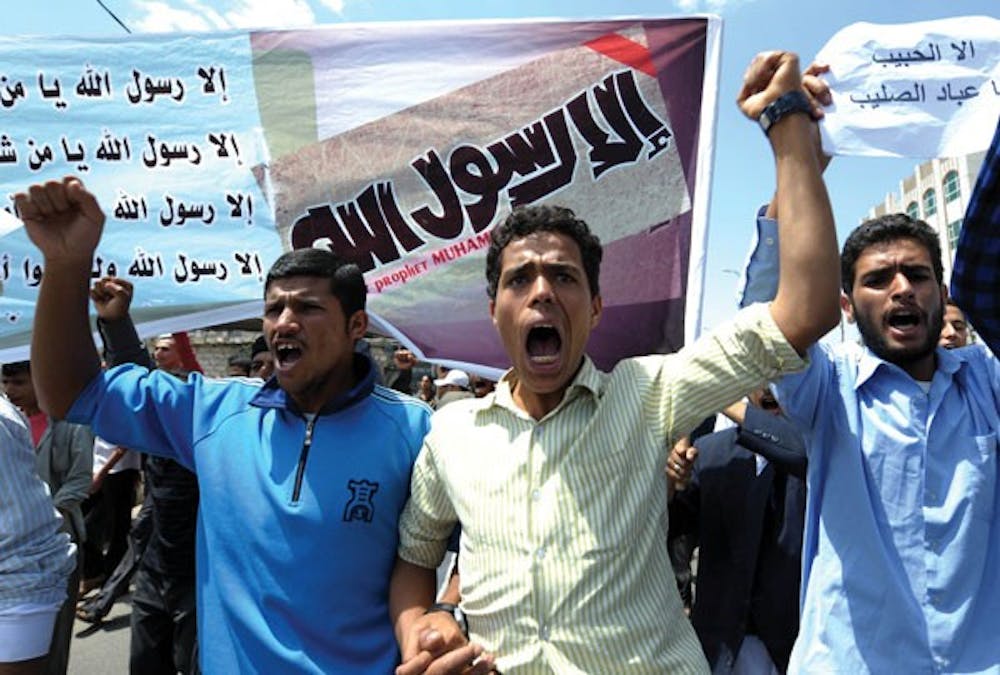Students and faculty had mixed reactions to this week’s Middle East protests and Tuesday’s attacks on U.S. embassies in Libya and Egypt.
Hundreds of protesters in Cairo stormed the U.S. Embassy walls, tore down the U.S. flag and replaced it with an Islamic flag Tuesday.
U.S. Ambassador to Libya J. Christopher Stevens and three diplomats were killed when protesters burned the lightly-guarded U.S. Consulate building in Benghazi, Libya.
Muslims in the two countries were outraged by a low-budget, anti-Islamic video made by a California filmmaker and posted on YouTube last week. Violence, apparently in response to the video, began on Tuesday.
Walter Cronkite School of Journalism and Mass Communication Hubert H. Humphrey Fellow Kareem Awadalla, a host of an Egyptian political and social television show, said there are underlying issues that help fuel such strong reactions from people in the Middle East.
He said the U.S. knows about deeper social complaints, but chooses to ignore them.
“There is a conflict that the U.S. is not seeing,” Awadalla said. “It started with (9/11) and the ‘War on Terror,’ then not finding weapons of mass destruction in Iraq, then the portrayal of Muslims as evil by some groups in the U.S.”
Awadalla said culturally charged rumors spread quickly in the Middle East.
 Yemeni protesters shout slogans outside the U.S. Embassy in Sanaa, Yemen, on Thursday. (Photo courtesy of MCT)
Yemeni protesters shout slogans outside the U.S. Embassy in Sanaa, Yemen, on Thursday. (Photo courtesy of MCT)“I tried to bring this up to the former U.S. Ambassador to Egypt, Margaret Scobey,” Awadalla said. “When I asked her why the U.S. doesn’t do more to squash these rumors, she did not give me an answer to my question.”
He said the region does not dislike Western culture, but finds the American way of life to be drastically different from that of Muslims.
“Religion is a very sensitive issue in Egypt,” he said. “It is comparable to the N-word here in America. There are things you just don’t say or do to offend people of faith.”
Awadalla said many people in the region enjoy watching American films, but by doing so are baffled by what seems to be an American cultural acceptance of violence and promiscuity.
Political science professor Reed Wood said the heart of the issue is the U.S.’s low popularity in the Middle East.
“But it also varies greatly country-by-country,” he said.
Wood said former Egyptian president Hosni Mubarak was good at quickly quashing groups that cause trouble, but with new leader Mohamed Morsi, this is not the case.
He said citizens are uncertain of whether there will be government crackdowns on protests.
“Will they stomp it out, or will the government stoke it? I think the U.S. needs to flex a little bit of muscle, but there does not need to be a strike against the country,” Wood said.
Wood and Awadalla agreed that anger over cartoons, movies and other forms of media depicting the prophet Muhammad irreverently is only one component to an underlying resentment toward Western culture.
Both Egyptian and Libyan presidents have denounced the violence, made apologies on behalf of their countries and promised to step up security.
U.S. Secretary of State Hillary Clinton said in a State Department meeting Thursday that strong steps were being taken to distance the U.S. government from the movie that caused the uproar.
She called the film “disgusting and reprehensible” while also condemning the violence in response to the film.
Justices studies junior Miles Guggemous participates in ASU’s ROTC program.
“A lack of response by the U.S. … was clearly visible to the world,” he said. “I don’t think there was a strong stance on the situation.”
Dance and pre-medical freshman Ashlyn Meyer said she thinks most students don’t really pay attention to world events.
“Most college students feel a disconnect with things going on around the world,” Meyer said. “A lot of students don’t research; they see a news flash and don’t look further into it.”
Health science freshman Saredo Ahmed, an international student from Mogadishu, Somalia, said the U.S. government did a good job responding to the situation.
“The Obama administration didn’t jump to conclusions right away,” Ahmed said. “The strongest country in the world shouldn’t act quickly.”
Reach the reporter at rvalcho@asu.edu




